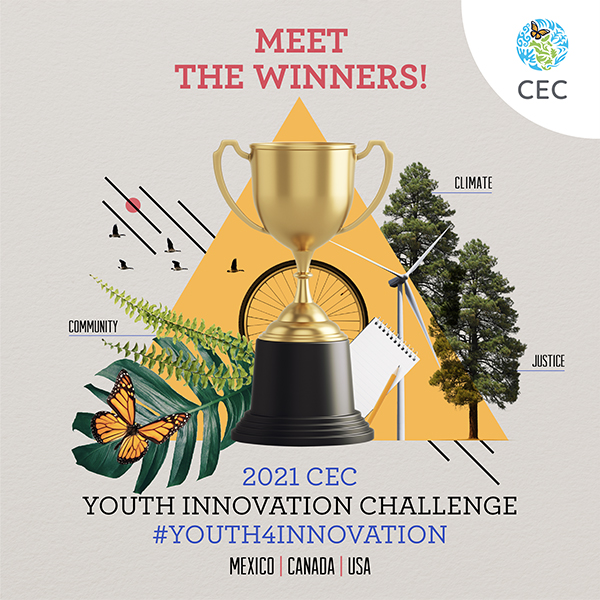Winners of 2021 CEC Youth Innovation Challenge Announced

The young entrepreneurs will present their climate and environmental justice innovations to the CEC Council and receive up to C$15,000 in seed funding.
Montreal, 31 August 2021—The Commission for Environmental Cooperation (CEC) is pleased to announce the winners of the fifth annual Youth Innovation Challenge, selected among submissions from Canada, Mexico and the United States. For the first time ever, the CEC chose four winners for the Youth Innovation Challenge:
- Gabriel Saunders (Canada): “Decomp” – an organic plastic waste disposal solution that utilizes proprietary, plastic-degrading microbes to facilitate the degradation of plastics in weeks.
- Claudia del Carmen Cornelio Caraveo (Mexico): “Sustainable Habitat for Honey-Producing Bees” – a device that physically supports apiaries, prevents ant infestations, and provides water during droughts and dry seasons, supporting marginalized communities that have seen declines in honey-producing bees.
- Emilio Gómez (Mexico): “Mobile School for Community Forestry” – a pilot continuous training program supporting producer families with tools and education to empower communities and local leaders to produce sustainably.
- Xiangkun “Elvis” Cao (United States): “C2X” – an initiative for transforming ‘fugitive’ CO2 emissions from power plants into sustainable solar commodities, particularly helping marginalized communities located near coal-fired plants.
This year, the annual challenge focused on the theme of “Climate Change and Environmental Justice Innovations for Resilient Communities.” North American youth aged 18 to 30 were challenged to submit innovative entrepreneurial solutions that can address environmental challenges and opportunities for communities in Canada, Mexico and the United States.
“Facing climate change, supporting environmental justice, and building community resilience are some of the most salient environmental challenges in North America,” said Richard A. Morgan, Executive Director of the CEC Secretariat. “Increasingly, youth are making headway and finding solutions for a sustainable future in North America. This year’s winners demonstrate how young people can bring fresh perspectives and tangible solutions to environmental justice and community resilience in the face of climate change.”
The winners of the Youth Innovation Challenge have been invited to join the North America’s top environmental officials to discuss their solutions at the annual CEC Council Session.
Be sure to tune in virtually to this year’s CEC Council Session (#CEC28), which will take place on September 9 and 10, 2021. The Youth Innovation Challenge winners will present their solutions via live webcast on September 10 from 2:00 to 4:00 pm EDT.
This year’s Session will also feature the CEC’s first-ever youth roundtable discussion, on “The Role of Youth in Ensuring Environmental Justice Through Responses to Climate Change”, which will be held on September 9 from 10:00 am to 12:00 pm EDT. The event will include a moderated discussion about the key role that youth play in facilitating and ensuring environmental justice in North America.
For more details, visit the event page for the 2021 Council Session. You can also follow the CEC on Facebook, Twitter and Instagram for updates on the Council Session and on Sli.do using event code #CEC28 to ask questions or share your thoughts about North American environmental cooperation.
If you would like to know more about CEC initiatives, you can sign up for our newsletter and follow us on social media.
